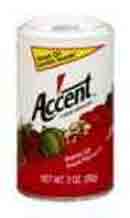 (Remember when they ran ads for this “flavor enhancer”, sprinkling MSG over everything from salads to steaks? Do they still make this stuff anymore? My entertaining has never been the same without it.)
(Remember when they ran ads for this “flavor enhancer”, sprinkling MSG over everything from salads to steaks? Do they still make this stuff anymore? My entertaining has never been the same without it.)
This topic of how to hail people during Saturnalia is getting staler every year, but there was a whole page of Letters to the Editor in the Trib last week about “putting the Christ back in Christmas.” I still have this argument with friends of mine who object to being told “Happy Holidays” instead of “Merry Christmas”, so I guess it’s not settled in anyone’s mind yet.
For an engaging examination of who can really claim this time of year as their own, check out Eric Zorn’s column today.
One December pastime is to take stock of the previous 11 months and see where you are and where you’ve been. If that is the case, the people screaming about how they’re dissed when someone says “Happy Holidays” must have a steel trap memory for perceived slights. Maybe they have a persecution complex. They must save up all their bile for the year looking for a respectable opportunity to release it, and somehow well wishers are a suitable target. This tone suffused all the Letters to the Editor that insisted “Jesus is the Reason for the Season.” It felt less like a call for Christians to reject commercialism and more like resentment that anyone else can crash the holiday party.
Political correctness is not at the core of this argument, although sometimes it does raise its head during school pageants and the like. There was never a magical time when everyone wished each other a “Merry Christmas”, consequences be darned, and anyone who believes there was is delusional. What the past held was a segregated, non-mobile society, in which Christians and Jews rarely mingled (with the exception of places like New York, Hyde Park and maybe Washington DC), atheists kept quiet about their convictions rather than be hounded and fired from jobs, and Muslims and Buddhists lived overseas where they belonged. In that era, it was entirely possible to tell everyone you know “Merry Christmas” without offending anyone. And because you could do it, the phrases “Seasons Greetings” and “Happy Holidays” had no air of capitulation, no feeling of compromise. They all meant the same thing because most of your friends and acquaintances were on the same page.
Everything was all hunky-dory in the past? Check out old newspapers for their seasonal advertising. Examine old photos, and keep an eye out during old movies. “Happy Holidays” was used just as often now as it was 50-60 years ago. It’s just that the atmosphere around it has changed.
You want to boycott stores that use the phrase “Happy Holidays,” go right ahead. As one of the commentators to Zorn’s blog post mentioned, just make sure that when you don your religious armor, you also apply your Christian standards to your shopping choices and avoid products made in brutal factories in China and Indonesia. That would be a fight worth having, one that might produce some positive results.

